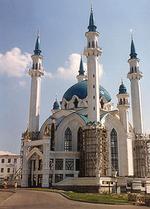| OVERVIEW |
 |
|
|
|
|
|
| Mail service |
 |
|
|
|
| Counters |
 |
|
|
|
| The best site 2004 |
 |
|

|
   |
|
|
Islam in Tatarstan
Pages: 1 2

According to historical sources and archeological excavations, ancestors of modern Tatars - Bulgars - began to join Islam in the first decades of IX century, and this process was finished in 922 by declaration of Islam the official religion of Volga Bulgaria.
Islam became the major factor of Bulgars culture foundation and the integral component of their national consciousness.
Acceptance of Islam opened opportunities of familiarizing with Arabic-Muslim culture, penetration into Volga-Kama region of philosophical and literary art ideas of the East that played an essential role in development of culture and scientifically philosophical idea. With acceptance of Islam the certain system of education was adjusted, moral basics of public life were transformed. As well as any other religion, Islam comprises universal moral values, preaches the ideals of validity, love, humanity, moral perfection; condemns cruelty, violence, money-making.
From XIII Volga Bulgaria repeatedly experienced heavy shocks, from different borders was attacked by strangers; despite of it, people survived and kept their originality. The major cementing force in preservation of its unity, ethnic integrity was Islam.
After the conquest of Kazan by Ivan IV it became even worse. Despite of social and economic and national oppressions on the part of Russian empire, Tatar people kept the culture - in this a serious role Islam played.
Religious and national prosecutions on the part of the imperial government orthodox missionaries resulted in preservation of religious norms among Tatars-moslems. But gradually there ripened forces feeling need of public changes and withdrawal from dogmas of medieval ideology and traditions. The banner of this movement was lifted for the first time by one of ancestors of educational movement among Tatars - G.Kursavi (1776-1812) who asserted rights of everyone on independent search of true. This line was continued by outstanding tatar educator S.Mardzhani (1818-1889). They thought necessary precondition of updating of public life revision of stagnant norms of Sheriyat and reassessment of religious dogmas which ceased to answer needs of public practice.
Harmonious interaction of religious and secular knowledge was almost achieved. But this natural process was interrupted by the October revolution and the policy which began to be carried out by bolsheviks in relation to religion.
The Muslim clergy ambiguously reacted on Bolsheviks revolution. The loyal attitude of Tatars to new authority explains partly by influence of Islamic movement inside the party of bolsheviks which spokesman M.Sultan-Galiev was. He and some attendants of the cult tried to show the generality of ideas of the socialism, communism and Islamic doctrine.
After route of Sultan-Galiev's movement the attitude to Islam became irreconcilable. Cinemas, theatres, museums, clubs, libraries, periodicals - all was used as means of struggle against religion. Created in 1922 Tatar Communistic university trained atheists. The law demanding obligatory registration of religious associations practically cancelled the separation
of religion from the state proclaimed earlier. next>> Pages: 1 2
|
|
|
|
|
|
Traveller's view  |
|
|
| Wed Jul 9 |
| night / day: | °/°C |
 |
|
| Thu Jul 10 |
| night / day: | °/°C |
 |
|
|
|
|
|
Central Bank rates
|
|
 Dollar USA
Dollar USA
|

|
 Euro
Euro
|

|
|
| Navigation |
 |
|
|
|
| Search |
 |
|
|
|
|


